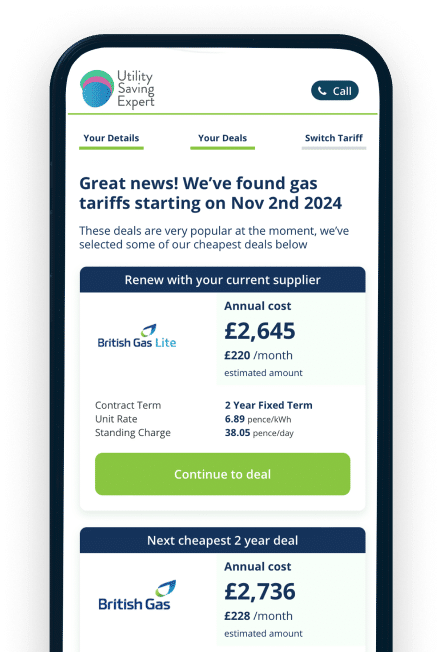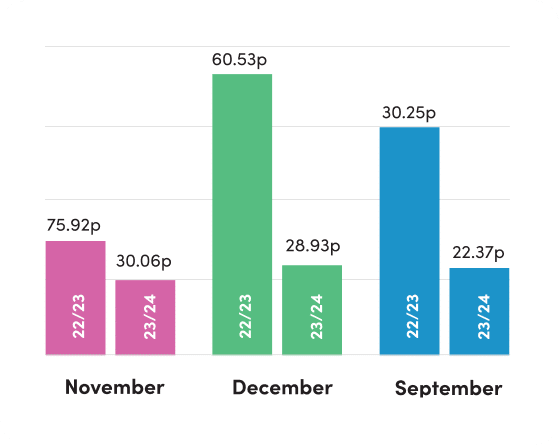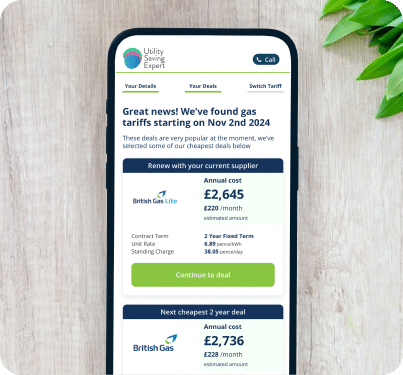
Business Electricity Comparison
Compare Business Electricity Prices, Suppliers & kWh Rates
We work with a panel of trusted business energy suppliers, so you can switch with confidence.
Compare Today's Rates
How To Compare Business Electricity Rates And Switch Suppliers
Follow these four simple steps to switch business electricity suppliers today:
Enter your business postcode details on our form. If you need help, call our energy experts on 01242 32 31 31
We’ll provide you with a list of business energy quotes and tariffs that fit your needs.
Compare the different business energy contracts and choose the one you like. Your new supplier will handle the switch on your behalf.
Your switch will be complete within 4 to 6 weeks; sit back and enjoy the savings on your next energy bill.
What Makes Our Business Electricity Comparison Tool Stand Out?
Our comparison platform does more than just list potential commercial suppliers; it gives a detailed breakdown of each offer, including:
Tariff type
Duration of the Contract
Extra perks or features
With this comprehensive information, you can choose an option that aligns perfectly with your company’s energy usage, financial plan, and sustainability goals.
Plus, we understand the volatility of the energy market and that prices can change due to a variety of factors. Our online comparison tool provides real-time commercial energy data, ensuring you’re presented with the latest and most competitive prices on the market.

Compare Business Electricity Prices, Suppliers & kWh Rates

Are Business Electricity Prices Getting Cheaper?
Yes, commercial electricity prices have dropped significantly, falling by 62% since October 2022. Experts, including Cornwall Insight, expect prices to remain stable in 2025, making this an ideal time for businesses to lock in competitive electricity tariffs.
Prices have fallen from over 58p per kWh in January 2023 to just over 26.5p per kWh in March 2025, providing substantial savings for business owners. However, the energy market remains unpredictable, and fluctuations are always a possibility.
Businesses eager to take advantage of these reduced rates should act quickly to secure the best deals. This graph highlights the dramatic drop in business electricity prices, illustrating the opportunities available for cost-saving in the current energy market.
Business Electricity Rates For Large Businesses
Need a tailored electricity plan for your large business? We can help!
Whether you have one location or many, we’ll find a competitive rate that fits your specific needs. Our team will work with you to get the best business electricity deals from our network of trusted suppliers.
Business Electricity Rates For SME Businesses
Looking for the best electricity deal for your small business? We’ll help you compare business electricity costs from multiple providers across the UK.
Our easy-to-use online tool lets you find the perfect plan for your business, anytime, anywhere.
What Are The Latest Business Electricity Prices In 2025?
Several factors impact the cost of business electricity, such as your location, energy consumption, and business size. The cheapest business electricity price in 2025 is 26.2p per kWh for large businesses, while microbusinesses pay 26.6p per kWh.
We’ve outlined the average commercial electricity rates below based on business size to assist you in finding the best business electricity supplier.
| Size | Annual energy usage (kWH) | Unit price per kWh | Daily standing charge | Annual cost | |
|---|---|---|---|---|---|
| Microbusiness | Up to 5,000 | 26.6p | 54.4p | £863.11 | |
| Small business | 5,000 – 15,000 | 26.6p | 66.7p | £2,899.18 | |
| Medium business | 15,000 – 25,000 | 26.3p | 73.7p | £5,525.87 | |
| Large business | 25,000 – 50,000 | 26.2p | 122.2p | £10,525.87 |
These figures reflect a 2-year fixed tariff based on respective business sizes. Prices reflect a live market and may vary over time.Data correct as of March 2025
Understanding what makes up your business electricity bill
- Unit rate is the price you pay for each kilowatt-hour (kWh) of electricity your business uses. It is charged in pence per kWh. Larger businesses often get a better deal on this rate due to higher consumption.
- Standing charges are fixed fees you pay regardless of how much electricity you use. It covers the cost of maintaining the power grid and delivering electricity to your business. This is charged in pence per day.
- Climate change levy (CCL) is an environmental tax businesses pay for electricity (0.775p/kWh until 31 March 2025). You are exempt from these charges if you consume less than 1,000 kWh of monthly electricity.
- VAT is charged at a standard rate of 20% for all UK businesses that generate £90,000 in annual turnover. You may be eligible for a 5% VAT discount if you can prove 50% of your household’s electricity is used for business purposes – applicable if you work from home.
Business Electricity Prices Per kWh Explained
Kilowatt-hours (kWh) are how suppliers measure and charge for your electricity. The price per kWh, or unit rate, varies based on your business’s specific needs.
What’s best for one company might not be the best for another. We can help you compare prices from different suppliers to find the perfect deal for your business.
Who Has The Cheapest Business Electricity Rates In 2025?
As of March 2025, the cheapest business electricity supplier is Scottish Power, offering rates at 24.4p per kWh with a standing charge of 125p per day. Below is a full breakdown of the top suppliers and their electricity rates.
| Supplier | Unit price per kWh | Daily standing charge | Annual cost | |
|---|---|---|---|---|
| British Gas | 27.4p | 62p | £7,070.59 | |
| British Gas Lite | 27p | 42p | £6,890.98 | |
| Valda | 27.6p | 73.3p | £7,156.20 | |
| Scottish Power | 24.4p | 125p | £6,543.76 | |
| Smartest Energy | 26.2p | 62.3p | £6,775.11 |
Based upon a business using 25,000 kWh of electricity annually, on a 2-year fixed-rate deal.
Data updated March 2025.

How To Find The Cheapest Business Electricity Rates
Our online platform compares business electricity tariffs from a variety of suppliers, making it easy to identify competitive rates. Businesses using half-hourly meters can benefit from more precise data on energy consumption, which can be helpful when negotiating tailored contracts.
Once you’ve shortlisted a few electricity providers, ask each supplier to provide a hardcopy quotation. Use these quotes as leverage to negotiate the best rates, ensuring your business secures a deal that aligns with both your budget and energy needs.
Acting quickly in the current market ensures you can take advantage of reduced rates while prices remain stable, helping to lock in long-term savings.

Compare Business Electricity Prices, Suppliers & kWh Rates
What Types Of Business Electricity Tariffs Are Available?
There are several business electricity tariffs available in the UK:
Fixed-rate business tariffs
Fixed rates lock in electricity prices for the entire duration of your business electricity contract. It is the most popular choice for businesses because it offers price stability and peace of mind.
This means that if wholesale prices rise, your unit price remains constant – allowing for better budgeting and financial planning.
However, fixed-rate business energy contracts are typically longer (up to five years) than domestic contracts (one to three years).
Pass-through tariffs
Pass-through rates are charges on a business’s energy bill for costs that are beyond the control of the energy supplier, such as transmission, distribution and government levies.
For instance, fixed-rate contracts lock in the price per unit of electricity, but other charges like network fees and green levies may fluctuate, leading to some variation in your monthly bill. Pass-through rates show this transparency so you can see exactly what each cost is.
Out-of-contract business rates
If you don’t switch plans before your contract ends, you automatically go onto much higher “out-of-contract” rates when no contract is in place.
Businesses may find themselves on out-of-contract rates if they fail to negotiate a new deal before their current fixed-rate contract expires or if they move to a new location and don’t immediately set up an energy contract.
Business smart meters
Smart meters track your exact energy usage and send the readings automatically. This means no more estimated bills or manual meter readings – you only pay for the electricity you use.
Green electricity tariffs
Green – or renewable electricity – tariffs are when your electricity supplier matches the electricity you buy with renewable energy sources. If sustainability is what you’re after, opt for green tariffs to reduce your carbon footprint and potentially save money on your business electricity bills.
Variable kWh rate
This plan adjusts your unit price monthly based on the wholesale market. It’s flexible and can save money when prices drop, but budgeting can be tricky as costs fluctuate.
Rollover tariffs
Rollover tariffs are essentially a penalty for inaction.
Businesses may find themselves with rollover tariffs when they “forget” to renew or renegotiate new contract terms with their current supplier.
Rollover tariffs automatically renew if the business doesn’t switch suppliers or negotiate a new deal before the current deal ends. These are significantly more expensive than the original contract rates.
Rollover tariffs may look similar to out-of-contract deals but differ ever so slightly. Rollover rates are applied when the supplier automatically “rolls over” your tariffs to a new contract whereas out-of-contract tariffs apply when you don’t have a contract in place.
Deemed business rates
Deemed business rates are applied when businesses move into new premises without having set up an electricity contract with a new supplier. They have one of the highest electricity rates!
These rates differ from out-of-contract deals as they occur when no previous contract was put into place. Out-of-contract tariffs are when businesses have/had an existing contract but didn’t negotiate new terms before the contract expired.

How To Compare Business Electricity Rates?
Comparing business electricity rates goes beyond looking for the cheapest deal. It involves knowing:
- Your annual electricity consumption
- Your current supply type
- Your current energy supplier
- Your current commercial contract
Armed with this knowledge, you’re better equipped to compare electricity tariffs from various energy suppliers. Whether you’re a micro business or a large enterprise in the UK, Utility Saving Expert can help you find the best deal by comparing prices from various reputable energy suppliers within minutes.
And with the high cost of electricity, cutting costs can substantially increase business profitability. Switching suppliers for your business electricity supply can potentially reduce your electricity bill by 45%!
Here’s what you need to do first:
Annual electricity usage
Contract status
Annual electricity spend
Contract end date
Know your supply type
Business Electricity Suppliers We Work With
We’ve partnered with a mix of established and up-and-coming UK business electricity suppliers to help you find the ideal fit for your operational needs:

British Gas
As the UK’s largest energy provider, British Gas supplies more than 350,000 businesses. Zero-carbon electricity is standard, and 100% renewable electricity tariffs are available.

EDF Energy
EDF is one of the largest business electricity providers for SMEs. EDF offers online account management, smart metering, and EV charging services.

SSE
Business electricity tariffs with both fixed-price plans and fully flexible contracts are available. SSE generates 100% renewable electricity from their own wind and hydro assets.

Valda Energy
Valda offers 24/7 account management with flexible business electricity payments.

Crown Gas & Power
Crown Gas & Power is known for its competitive pricing and has been serving the UK for over two decades.

Scottish Power
Scottish Power, part of the Iberdrola Group, offers competitive renewable electricity prices to the domestic and non-domestic sectors.

Compare Business Electricity Prices, Suppliers & kWh Rates
Emerging Energy Suppliers
Smaller, forward-thinking firms offer distinctive plans and competitive rates, with a keen emphasis on ensuring customer satisfaction.
- BG Lite
- Opus Energy
- Total Gas & Power
- British Gas Plus
- Smartest Energy
See our full list of reputable business energy suppliers here
Business Electricity Rates For SME Businesses
These business energy suppliers often endorse renewable energy sources, offering green business tariffs that align with the UK’s net zero goal.
- Corona Energy
- Haven Power
- Npower
- E.ON
- Advanti Gas
- Squeaky
Why Switch Business Electricity Suppliers With Utility Saving Expert?
Here’s why you should choose Utility Saving Expert for your business electricity switch:
Guaranteed best electricity deals
Our cutting-edge system uses the latest pricing to find you the most competitive deals, every time.
Wide range of reliable suppliers
We’ve partnered with a wide range of energy suppliers, such as British Gas, Npower, EDF Energy, and Octopus Energy, ensuring you get both excellent rates and dependable service within minutes.
Hassle-free switching process
Every year, thousands of UK businesses rely on us for our innovative technology and expert team to simplify the process of switching suppliers. Whether you’re thinking about moving to a new supplier or discussing terms with your existing one, we’re committed to getting you the most favourable deal possible.
Socially-conscious business comparison
We donate 10% of our profits to charities that combat fuel poverty, extending our positive influence beyond just your business.
Transparent, unbiased advice
We pride ourselves on being open and transparent. We offer impartial, unbiased comparisons of the commercial energy market, ensuring you get the best rates based on your specific needs.
Fast online price comparison
Compare business gas and electricity prices and switch your provider within minutes

Compare Business Electricity Prices, Suppliers & kWh Rates
Frequently Asked Questions (FAQs)
Should I fix my business electricity rates?
It’s beneficial for businesses to fix their electricity rates (i.e. fixed-rate tariffs) as this allows for better budgeting and financial planning.
Is business electricity cheaper than residential?
Business electricity has cheaper tariffs when compared to domestic electricity due to higher consumption volumes. However, additional charges like 20% VAT (only 5% for domestic) and the Climate Change Levy can make business energy bills seem more expensive overall.
Will my business electricity meter need to be replaced if I switch supplier?
Standard meters usually don’t need to be replaced, but smart meters may need replacing if they are incompatible with your new energy supplier.
Who are the Big Six energy suppliers in the UK?
The “Big Six” are dominant energy providers in the UK who hold the largest market share, namely:
- British Gas
- EDF Energy
- E.ON
- NPower (now a subsidiary of E.ON Energy)
- Scottish Power
- SSE Energy
Is the Energy Bills Discount Scheme still available for high-consuming businesses?
No, the Energy Bills Discount Scheme (EBDS) ran for 12 months from 1 April 2023 to 31 March 2024, replacing the Energy Bill Relief Scheme (EBRS) from the previous year.
How much electricity should my business be using and what is the cost?
Electricity consumption varies widely depending on the size of your business, location, current tariffs, and the amount of electricity you use.
For instance, microbusinesses using up to 5,000 kWh of electricity can expect to pay around £932.44 for annual electricity bills. Larger businesses, using 25,000 – 50,000 kWh of electricity, can pay in excess of £10,000 for annual bills.
What factors affect business electricity prices?
Several factors influence how much your business pays for electricity, including:
- Wholesale Energy Costs – Prices fluctuate due to supply and demand, geopolitical events, and energy market trends.
- Business Size & Usage – Larger businesses often get lower rates due to bulk energy consumption.
- Location – Energy distribution charges vary by region, meaning prices can be higher or lower depending on where you operate.
- Contract Type & Length – Fixed-rate deals lock in prices, while variable tariffs can change month to month.
- Time of Use – Some businesses benefit from off-peak rates if they use electricity outside of peak hours.
- Government Levies & Taxes – Green energy initiatives, VAT, and the Climate Change Levy all impact costs.
Understanding these factors can help you make informed decisions when switching suppliers or negotiating a new contract.
Can I get a new commercial electricity meter installed?
Yes, if your business needs a new electricity meter, you can arrange an installation through your supplier. Here’s what you need to know:
- Standard Meters – Suitable for most businesses with straightforward energy needs.
- Half-Hourly Meters – Mandatory for businesses using over 100,000 kWh per year, providing precise usage data every 30 minutes.
- Smart Meters – Send real-time readings to suppliers, eliminating estimated bills and helping businesses monitor usage.
- Multi-Rate Meters – Useful for businesses that benefit from different rates at different times (e.g., Economy 7 or Economy 10).
Installation is usually free with some suppliers, and switching to a more advanced meter can help improve efficiency and reduce costs.
What is the smart export guarantee scheme?
The Smart Export Guarantee (SEG) is a government-backed initiative that pays businesses for excess electricity they generate and export back to the National Grid.
If your business has solar panels, wind turbines, or other renewable energy sources, you can earn money for every unit of unused electricity you send to the grid. Payments are set by suppliers, so it’s worth comparing SEG rates to find the best deal.
To qualify, you’ll need:
- A renewable energy system under 5MW capacity
- A smart meter to track exports accurately
- A supplier offering SEG payments
This scheme makes renewable energy even more cost-effective, allowing businesses to cut electricity bills while earning extra revenue.

Compare Business Electricity Charges, Suppliers & kWh Rates with Utility Saving Expert
Utility Saving Expert can help you get cheaper business electricity by comparing quotes from top UK providers. Use our handy online comparison tool to compare quotes based on your specific needs and what you want from your business electricity.







